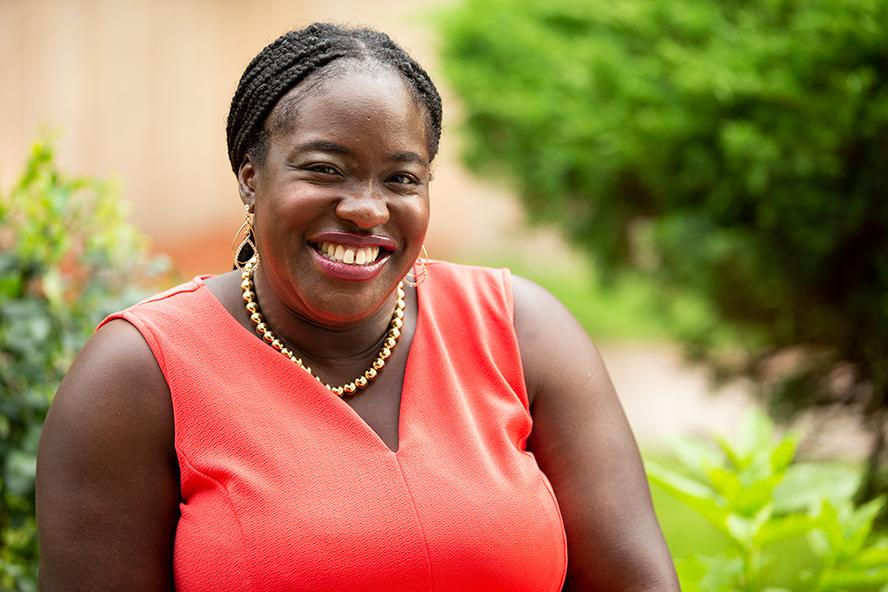-
About
- Departments & Offices
-
Academics
- Public Health
- Biomedical Sciences
- Physician Assistant
- Special Master’s (MBS)
-
Admissions & Financial Aid
- Tuition & Fees
-
Student Experience
-
- Student Resources by Program
- Academic & Student Support
- Wellness & Wellbeing
- Student Life
- Events & Traditions
-
-
Research
- Research Labs & Centers
- Tufts University-Tufts Medicine Research Enterprise
-
Local & Global Engagement
- Global Health Programs
- Community Engagement
Public Health professor spearheads effort to reduce racial disparities in maternal health.
Learn about Ndidiamaka Amutah-Onukagha, the Julia A. Okoro Professor of Black Maternal Health and assistant dean of diversity, equity, and inclusion at Tufts University School of Medicine.

Photo:Matt Healey
By Monica Jimenez
When Ndidiamaka Amutah-Onukagha, expecting her first child, went in for an ultrasound, her doctor didn’t introduce himself or explain the procedure. They ended up having a good conversation, but only after Amutah-Onukagha asked him where he did his Ph.D., and found they had acquaintances in common.
She linked her experience to a broader pattern of inadequate treatment. “Black women die because of these microaggressions, which ultimately result in poorer care than their counterparts receive,” said Amutah-Onukagha, the Julia A. Okoro Professor of Black Maternal Health and assistant dean of diversity, equity, and inclusion at Tufts University School of Medicine.
Black women are three times as likely as non-Hispanic white women to die from pregnancy-related complications, said Amutah-Onukagha, who is one of six principal investigators in the U.S. awarded NIH funding to investigate these disparities.
Now Amutah-Onukagha is embarking on an ambitious new effort to change those numbers, supported by the $2 million, five-year term professorship she was awarded this summer. Funded by an anonymous couple, the professorship is named for her maternal grandmother, who was a traditional birth attendant, or midwife, in Nigeria. Amutah-Onukagha plans to use the financial support to establish and direct a maternal health center unlike any other.
“I now have a real, formal opportunity to address everything I’ve been passionate about and every injustice I’ve seen, and shape solutions with a talented repository of people who feel the same way,” she said.
The founder and principal investigator of the Maternal Outcomes for Translational Health Equity Research (MOTHER) Lab at Tufts, from which the center will grow, Amutah-Onukagha is already working on the first step: training undergraduates, medical students, and postdocs in maternal health, implicit bias, and reproductive justice, with a particular eye toward mentoring people of color.
She is also assembling the advisory board that will guide the center’s work, including midwives, OB-GYNs, and Black women who have experienced negative pregnancy-related outcomes such as hemorrhages. Next, she will establish a research hub where students can train and partner with Black mothers interested in research. She will also connect maternal health and reproductive justice centers across the country through an affiliate network that will boost research ability, funding opportunities, and skill development.
“I see the center as a space at the intersection of clinical perspective, community engagement, and lived experience, bringing brilliant minds together with the broader goal to provide a supportive home for maternal health,” Amutah-Onukagha said.
This work comes at a crucial moment of national reckoning with systemic racism, said Aviva Must, chair of public health and community medicine at the School of Medicine. “Dr. Amutah-Onukagha’s work as a ‘scholar-activist’ stands to advance Black maternal health outcomes at a time when our current health statistics are a stain on our nation,” Must said. “The Okoro Professorship elevates her efforts, bringing visibility and foundational resources to the lab.”
The new dean ad interim of the School of Medicine, Helen Boucher, agreed. “Dr. Amutah-Onukagha is committed to fostering diversity and antiracism in the next generation of health-care professionals,” she said. “Her passion and expertise in Black maternal health, and her dedication to addressing systemic racism in health care, further establish the school as a leader in health equity.”
Amutah-Onukagha said she’s excited to help create a national strategy to reduce maternal health-care disparities, and a blueprint for other institutions. “But it’s bigger than any one person,” she said. “I’m here to hold the space and put the pieces together—and then step back so it can run on its own.”